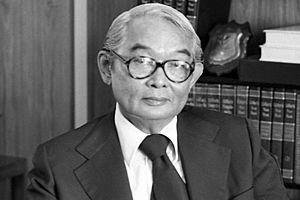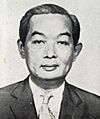Kukrit Pramoj facts for kids
Quick facts for kids
Mom Rajawongse
Kukrit Pramoj
|
|
|---|---|
| คึกฤทธิ์ ปราโมช | |
 |
|
| Prime Minister of Thailand | |
| In office 14 March 1975 – 20 April 1976 |
|
| Monarch | Bhumibol Adulyadej |
| Preceded by | Seni Pramoj |
| Succeeded by | Seni Pramoj |
| Minister of Interior | |
| In office 8 January 1976 – 20 April 1976 |
|
| Prime Minister | himself |
| Preceded by | Seni Pramoj |
| Succeeded by | Boonteng Thongsawat |
| Personal details | |
| Born | 20 April 1911 In Buri, Singburi, Siam |
| Died | 9 October 1995 (aged 84) Watthana, Bangkok, Thailand |
| Cause of death | Heart disease and high blood pressure |
| Nationality | Thai |
| Political party | Social Action Party |
| Spouse | M.L. Pakpring Thongyai (Divorced) |
| Children | 2 |
| Alma mater | The Queen's College, Oxford |
| Profession | Scholar Writer Politician Army officer |
| Signature | |
| Military service | |
| Allegiance | |
| Branch/service | |
| Rank | Major General VDC Gen. |
| Commands | Royal Thai Aide-De-Camp Volunteer Defense Corps |
| Battles/wars | Pacific War |
Mom Rajawongse Kukrit Pramoj (Thai: คึกฤทธิ์ ปราโมช, RTGS: Khuek-rit Pramot 20 April 1911 – 9 October 1995) was an important person in Thailand. He was a politician, a smart scholar, and a professor. He even served as the Prime Minister of Thailand from 1975 to 1976. His older brother, Seni Pramoj, was also a Prime Minister. Kukrit was a member of the Thai royal family because he was the great-grandson of King Rama II.
Besides his political work, he was also an actor! He played the Prime Minister of a made-up country in the 1963 movie The Ugly American, starring Marlon Brando.
Contents
Life Story of Kukrit Pramoj
Kukrit Pramoj was born on April 20, 1911, in Sing Buri Province, Thailand. His family was part of the royal family. His father was Brigadier General Prince Khamrob, and his mother was Daeng. His older brother was Seni Pramoj.
Like many wealthy Thai children of his time, Kukrit went to boarding schools in England, including Trent College. He later studied at Queen's College, University of Oxford, where he earned a degree in Philosophy, Politics, and Economics.
When he returned to Thailand, he first worked in banking. But he was truly passionate about art, writing, and politics. He was a very talented writer and journalist. He even started his own newspaper called Siam Rath.
In 1948, Kukrit and his brother, Seni Pramoj, wrote a book called The King of Siam Speaks. They did this because they felt a Hollywood movie, Anna and the King of Siam, did not show their beloved King Mongkut correctly. Their book helped set the record straight.
Kukrit was also known for his stories about Thai society. In 1953, he started a series of stories about a fictional character named Mae Ploy. These stories showed how Thai people adapted to modern life. He wrote many books, including Many Lives, which was translated into English. He was an expert on traditional Thai culture, from classical dance to literature. In 1985, he was named a National Artist of Thailand for his amazing writing. He also received the Fukuoka Asian Culture Prize in 1990.
Kukrit Pramoj was married to M.R. Pakpring Thongyai, and they had two children. He passed away on October 9, 1995. His former home in Bangkok is now a museum, showing his life and Thai traditions.
What Kukrit Pramoj Achieved
Kukrit Pramoj had many important achievements throughout his life:
- He started the Social Action Party, a political group.
- He founded the Progress Party in 1946 and was elected to the first Parliament after World War II.
- He acted in the movie The Ugly American (1963), playing Prime Minister Kwen Sai. He spoke both Thai and English in the film.
- As Prime Minister, he made Thailand friends with China in 1975. He also oversaw the removal of American soldiers from Thailand after the Vietnam War.
- He was named a National Artist in Literature in 1985, which is a very high honor for writers in Thailand.
- He received the Fukuoka Asian Culture Prize in 1990 for his contributions to Asian culture.
- He started the Khon Thammasat Troupe at Thammasat University. Khon is a very special and high form of traditional Thai dance.
Kukrit Pramoj's Acting Role
When the movie The Ugly American was being filmed in Thailand, Kukrit Pramoj was asked to be a cultural advisor. His job was to make sure the movie showed Thai culture and monarchy correctly. The director, George Englund, was so impressed with Kukrit's knowledge and English skills that he offered him the role of the fictional Prime Minister.
Kukrit accepted, saying that "We are all actors anyway." After he became the real Prime Minister of Thailand in 1975, the word "Sarkhan" (the fictional country in the movie) became a playful nickname for Thailand itself.
M.R. Kukrit's Heritage Home
Kukrit Pramoj's home in Bangkok is now a special museum called the M.R. Kukrit Heritage Home. It has been recognized as the home of an important person. You can visit it on Saturdays, Sundays, and Thai holidays.
The house is built on a large piece of land with beautiful gardens. It's made up of five smaller, traditional Thai houses that were taken apart and then put back together at this location. Inside, you can see many old objects and books that Kukrit Pramoj collected. Even though it's a traditional house, it has some modern touches like air conditioning and a lift, which was added when he became older and couldn't use the stairs easily. The home is located at 19 Soi Phra Pinit, South Sathorn Road, Sathon District, Bangkok.
Kukrit Pramoj's Books
Kukrit Pramoj is very famous in Thailand for his many books. His most well-known novel is Four Reigns. This story was first published in his newspaper, Siam Rat, in 1950.
Four Reigns tells the story of a young girl named Mae Ploi. She grows up in the royal court of King Chulalongkorn (Rama V). The story continues through her marriage and covers the reigns of four different Kings of the Chakri Dynasty. It also talks about the 1932 Revolution, which changed Thailand from an absolute monarchy. This book is still very popular in Thai schools and has been made into famous films.
Only a few of Kukrit's many books have been translated into English, including Many Lives and Red Bamboo. He wrote a huge amount in Thai, covering many different topics. He wrote about politics, his love for dogs, Thai history, and even elephants! Many of his books started as columns in his newspaper.
Honors and Awards
Kukrit Pramoj received many honors and awards during his life, both from Thailand and other countries. These awards show how important and respected he was.
Awards from Thailand
- Knight Grand Cross (First Class) of The Most Illustrious Order of Chula Chom Klao
- Knight Grand Cordon (Special Class) of The Most Exalted Order of the White Elephant
- Knight Grand Cordon (Special Class) of The Most Noble Order of the Crown of Thailand
- Knight Grand Commander (Second Class, Upper Grade) of The Most Illustrious Order of Chula Chom Klao
- King Rama IX Royal Cypher Medal, First Class
- Dushdi Mala Medal - Civilian
Awards from Other Countries
 Malaysia: Honorary Grand Commander of the Order of the Defender of the Realm (1975)
Malaysia: Honorary Grand Commander of the Order of the Defender of the Realm (1975) Mexico: Grand Cross of the Order of the Aztec Eagle
Mexico: Grand Cross of the Order of the Aztec Eagle Philippines: Grand Collar of the Order of Sikatuna
Philippines: Grand Collar of the Order of Sikatuna Japan: Grand Cordon of the Order of the Rising Sun
Japan: Grand Cordon of the Order of the Rising Sun Germany: Grand Cross 1st Class of the Order of Merit of the Federal Republic of Germany
Germany: Grand Cross 1st Class of the Order of Merit of the Federal Republic of Germany Cambodia: Grand Cross of the Royal Order of Sahametrei
Cambodia: Grand Cross of the Royal Order of Sahametrei Portugal: Grand Cross of the Order of Prince Henry
Portugal: Grand Cross of the Order of Prince Henry
Other Recognitions
- He was a Professor at Thammasat University.
- He received the Fukuoka Prize from Japan in 1990.
Images for kids
See also
 In Spanish: Kukrit Pramoj para niños
In Spanish: Kukrit Pramoj para niños
 | Laphonza Butler |
 | Daisy Bates |
 | Elizabeth Piper Ensley |



